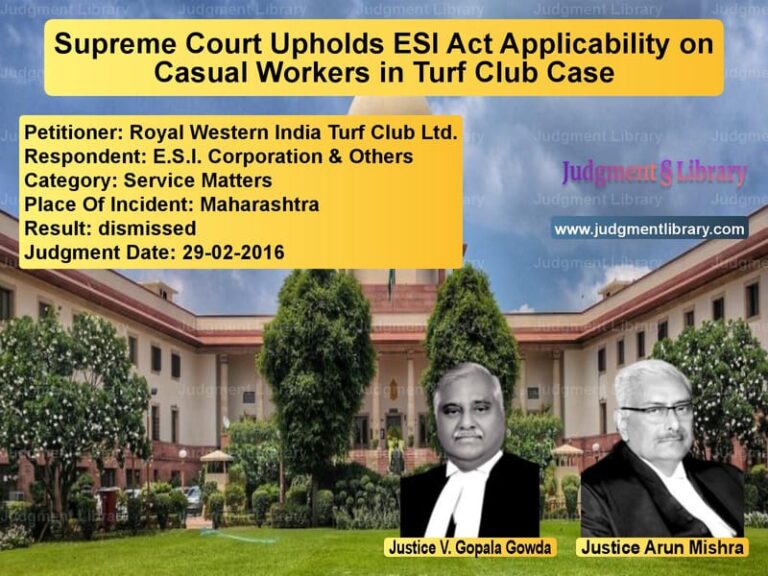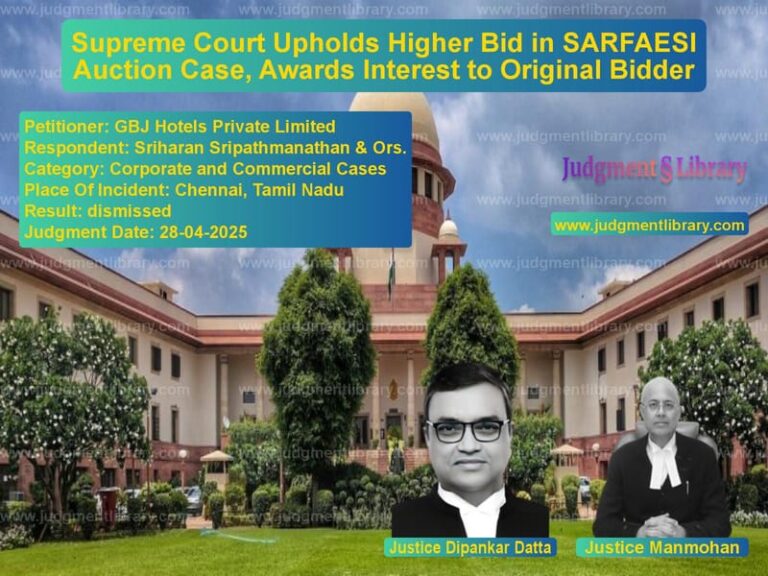Legal Framework for Freezing Bank Accounts Under PMLA: Opto Circuit India Ltd. vs. Axis Bank
The case of Opto Circuit India Ltd. vs. Axis Bank & Others is a landmark judgment that examines the scope of the Prevention of Money Laundering Act, 2002 (PMLA) concerning the freezing of bank accounts. The Supreme Court’s ruling clarifies the procedural requirements that the Enforcement Directorate (ED) must follow when restricting access to financial assets under an ongoing investigation.
In this case, Opto Circuit India Ltd. challenged an order that froze its bank accounts, claiming that the move had paralyzed its ability to pay statutory dues such as employee salaries and taxes. The Supreme Court found that the freezing order was issued without following due process and ruled in favor of the appellant.
Background of the Case
Opto Circuit India Ltd. is a company engaged in medical technology and manufacturing. In 2020, its bank accounts were frozen following investigations into alleged financial irregularities. The Enforcement Directorate issued a communication on May 15, 2020, directing banks to stop transactions from specific accounts linked to the company. The freezing order was imposed under Section 17 of the PMLA.
The company approached the Karnataka High Court, challenging the action taken by the ED. However, the High Court upheld the freezing order, ruling that the action was justified under the PMLA framework. Opto Circuit India Ltd. then moved the Supreme Court, arguing that the freezing of accounts was arbitrary and had been carried out without following the prescribed legal procedures.
Key Legal Issues
- Whether the Enforcement Directorate followed the legal requirements under PMLA while freezing the bank accounts.
- Whether the freezing order could be upheld despite procedural lapses.
- Whether the appellant was entitled to defreezing of accounts to pay statutory obligations.
- The interpretation of Section 17 of the PMLA regarding the process of freezing financial assets.
Arguments by Opto Circuit India Ltd.
- The company argued that freezing its accounts had caused financial distress, as it was unable to pay salaries, taxes, provident fund contributions, and other statutory dues.
- It contended that the ED had not recorded any reasons in writing for the freezing order, as mandated by Section 17 of the PMLA.
- The appellant produced a Chartered Accountant’s certificate indicating that Rs. 79,93,124 in statutory payments remained unpaid due to the freezing of accounts.
- It was further argued that under the PMLA, financial restrictions must be imposed only after compliance with due process, which had not been followed in this case.
Arguments by the Enforcement Directorate
- The ED maintained that the freezing order was necessary to prevent the movement and layering of illicit funds.
- The agency contended that the PMLA is a special legislation that grants overriding powers, allowing the ED to freeze bank accounts as part of its investigation.
- The ED argued that the accounts contained proceeds of crime and that allowing transactions could compromise the ongoing investigation.
- The agency also claimed that Opto Circuit India Ltd. had engaged in financial mismanagement, justifying the freezing of its accounts.
Supreme Court’s Analysis
The Supreme Court closely examined whether the ED had complied with legal requirements before freezing the accounts. The Court observed the following:
- “Section 17 of PMLA provides that an authorized officer must have reason to believe that an entity has committed acts of money laundering and must record such reasons in writing.”
- “Sub-section (1A) to Section 17 allows an officer to freeze property where it is not practicable to seize it, but such an order must be followed by compliance under sub-section (2).”
- “Under sub-section (4), the freezing must be followed by an application to the Adjudicating Authority within 30 days.”
The Court found that the ED had not followed these procedures. Instead, it had merely issued a communication to banks, instructing them to freeze the accounts.
Judicial Precedents Cited
The Court also referred to past cases where procedural compliance was emphasized:
- In Mohinder Singh Gill vs. The Chief Election Commissioner, it was held that an administrative order must be judged by the reasons given at the time of its issuance and cannot be supplemented with fresh justifications.
- In Chandra Kishor Jha vs. Mahavir Prasad, the Supreme Court reiterated that when a statute prescribes a method for exercising power, it must be followed strictly.
Final Judgment
The Supreme Court ruled in favor of Opto Circuit India Ltd., quashing the freezing order. The key directives included:
- The bank accounts were to be immediately defrozen.
- The appellant was permitted to make payments related to statutory obligations such as salaries and taxes.
- The ED was granted liberty to initiate fresh action in compliance with PMLA procedures.
Impact of the Judgment
This ruling has significant implications for financial investigations under PMLA:
- It reinforces the principle that statutory agencies must strictly adhere to procedural safeguards.
- It clarifies that financial restrictions imposed without following due process are liable to be struck down.
- It ensures that businesses facing legal scrutiny are not unfairly prevented from meeting their operational and statutory obligations.
Conclusion
The Supreme Court’s decision in this case underscores the importance of legal compliance in financial investigations. While the ED retains the authority to investigate money laundering cases and freeze accounts when necessary, this power must be exercised within the confines of the law. The judgment serves as a reminder that procedural safeguards exist to prevent arbitrary and excessive actions by enforcement agencies.
Petitioner Name: Opto Circuit India Ltd..Respondent Name: Axis Bank & Others.Judgment By: Justice S.A. Bobde, Justice A.S. Bopanna, Justice V. Ramasubramanian.Place Of Incident: Karnataka.Judgment Date: 03-02-2021.
Don’t miss out on the full details! Download the complete judgment in PDF format below and gain valuable insights instantly!
Download Judgment: opto-circuit-india-l-vs-axis-bank-&-others-supreme-court-of-india-judgment-dated-03-02-2021.pdf
Directly Download Judgment: Directly download this Judgment
See all petitions in Money Laundering Cases
See all petitions in Banking Regulations
See all petitions in Corporate Governance
See all petitions in Legal Malpractice
See all petitions in Judgment by S. A. Bobde
See all petitions in Judgment by A. S. Bopanna
See all petitions in Judgment by V. Ramasubramanian
See all petitions in allowed
See all petitions in Quashed
See all petitions in supreme court of India judgments February 2021
See all petitions in 2021 judgments
See all posts in Criminal Cases Category
See all allowed petitions in Criminal Cases Category
See all Dismissed petitions in Criminal Cases Category
See all partially allowed petitions in Criminal Cases Category







